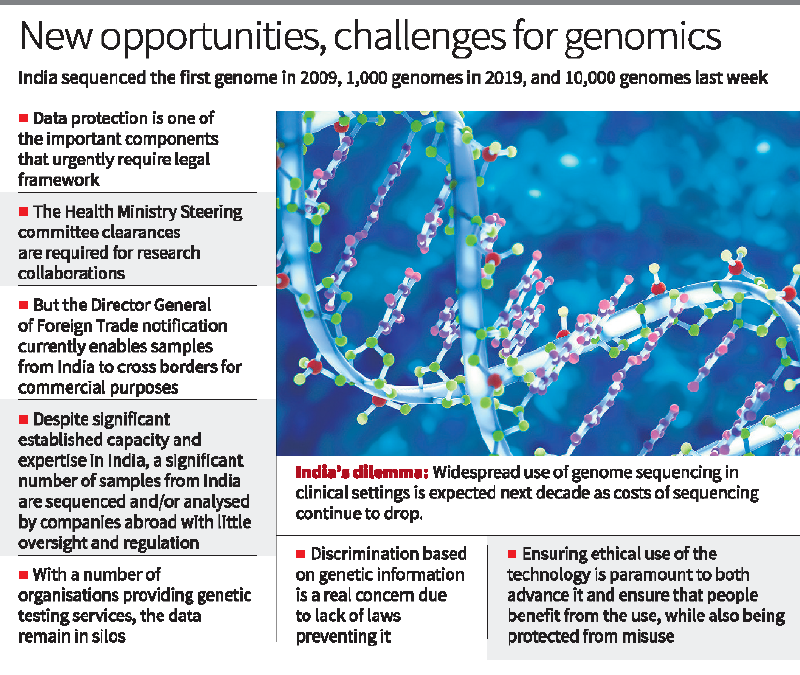Description

Disclaimer: Copyright infringement not intended.
Context
- In the wake of unprecedented advancements in genomics, driven by plummeting sequencing costs and expanding genomic data sets, India finds itself at a critical juncture.
- While the nation boasts significant strides in genomic research, the absence of a robust legal framework poses substantial challenges.
- Urgent action is required to address various issues, including data protection, equity, discrimination, and ethical use of technology.
Details
Key Issues
Data Protection and Oversight:
- Lack of regulations leads to the unchecked sequencing and analysis of Indian genome samples by foreign entities.
- Absence of oversight raises concerns regarding privacy, data security, and ethical use of genomic data.
Equity and Diversity:
- India's diverse population necessitates equitable access to genomic technologies and benefits.
- Unregulated market forces could exacerbate existing disparities, particularly affecting marginalized communities and the economically disadvantaged.
Prevention of Discrimination:
- Without legal protections against genetic discrimination, individuals face potential discrimination in insurance, employment, and healthcare access.
- Laws similar to the Genetic Information Nondiscrimination Act in the United States are crucial to safeguard individuals' rights.
Fragmentation of Genetic Data:
- Fragmented genetic data impedes data aggregation and utilization for public health decision-making.
- A legal framework is needed to facilitate the collection of summary information while ensuring privacy and enabling the development of cost-effective genetic tests.
Ethical Use of Technology:
- Mechanisms must be established to ensure the ethical use of genomic data and tests.
- Professional guidelines alone are insufficient; legal provisions are necessary to enforce compliance and prevent misuse of genomic technologies.

Introduction to Genomics
- Genomics is the study of the entire genome, encompassing all genes, their regulatory elements, and other DNA sequences within an organism's chromosomes.
History:
- Mendelian Genetics: Gregor Mendel's experiments with pea plants laid the foundation for understanding inheritance.
- Discovery of DNA: James Watson and Francis Crick elucidated the structure of DNA in 1953, which paved the way for understanding the genetic code.
- Human Genome Project (HGP): Initiated in 1990, the HGP aimed to sequence the entire human genome. Completed in 2003, it provided a reference sequence for further genomic research.
Key Components of Genomics:
Genome Sequencing:
- Whole Genome Sequencing (WGS): Determines the complete DNA sequence of an organism.
- Next Generation Sequencing (NGS): High-throughput sequencing technologies enable rapid and cost-effective sequencing of large genomes.
- Single-Cell Sequencing: Allows the study of individual cells' genomes, providing insights into cellular heterogeneity.
Structural Genomics:
- Structural Variation: Involves changes in the structure of an organism's genome, such as deletions, duplications, inversions, and translocations.
- Comparative Genomics: Compares the genomes of different species to understand evolutionary relationships and identify conserved regions.
Functional Genomics:
- Gene Expression Profiling: Analyzes the patterns of gene expression in different tissues or under various conditions.
- Epigenomics: Studies modifications to DNA and histones that regulate gene expression without altering the DNA sequence.
- Regulatory Genomics: Investigates the mechanisms controlling gene expression, including transcription factors and non-coding RNAs.
Applied Genomics:
- Medical Genomics: Utilizes genomic data for disease diagnosis, prognosis, and treatment, including pharmacogenomics and personalized medicine.
- Agricultural Genomics: Enhances crop breeding programs through marker-assisted selection and genetic engineering.
- Microbial Genomics: Studies the genomes of bacteria, viruses, and other microorganisms to understand pathogenesis, antibiotic resistance, and biotechnological applications.
Ethical, Legal, and Social Implications (ELSI):
- Privacy and Data Security: Ensuring the protection of individuals' genomic data from misuse or unauthorized access.
- Genetic Discrimination: Addressing concerns regarding discrimination based on genetic information in healthcare, employment, and insurance.
- Informed Consent: Establishing guidelines for obtaining informed consent from individuals participating in genomic research or undergoing genetic testing

Recent Advances:
Precision Medicine:
- Targeted Therapies: Identifies genetic markers associated with disease susceptibility or treatment response to develop personalized treatment strategies.
- Cancer Genomics: Characterizes the genetic alterations driving cancer development and identifies potential therapeutic targets.
Genome Editing:
- CRISPR-Cas9: Revolutionary genome editing tool enabling precise modifications to the genome with broad applications in basic research, biotechnology, and medicine.
- Gene Drives: Investigates the use of gene editing to control or eradicate disease vectors and invasive species.
Synthetic Biology:
- Genome Synthesis: Involves assembling artificial DNA sequences to engineer organisms with desired traits, such as biofuel production or drug synthesis.
- Xenobiology: Explores the creation of organisms with synthetic genetic codes to expand the biochemical capabilities of life.
Big Data and Bioinformatics:
- Data Integration: Integrating genomic data with other omics datasets (transcriptomics, proteomics, metabolomics) to gain a comprehensive understanding of biological systems.
- Machine Learning: Utilizing algorithms to analyze large-scale genomic datasets for pattern recognition, biomarker discovery, and predictive modeling.
Environmental Genomics:
- Metagenomics: Studies the collective genomes of microbial communities in various environments, providing insights into ecosystem dynamics and biogeochemical processes.
- Ecological Genomics: Investigates the genetic basis of adaptation and speciation in natural populations, particularly in response to environmental changes.
|
PRACTICE QUESTION
Q. The absence of a legal framework for genomics in India poses significant risks to privacy, equity, and ethical standards. Comment. (150 words)
|











